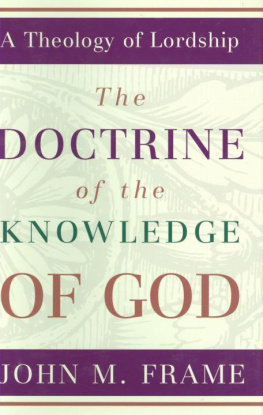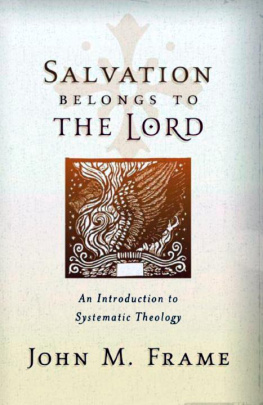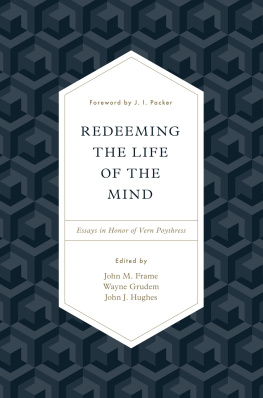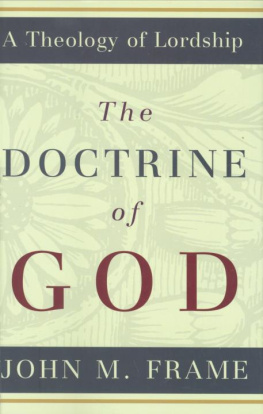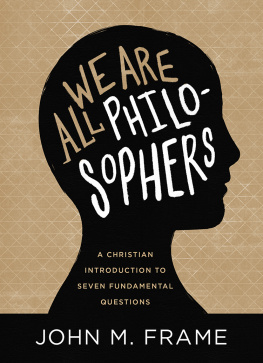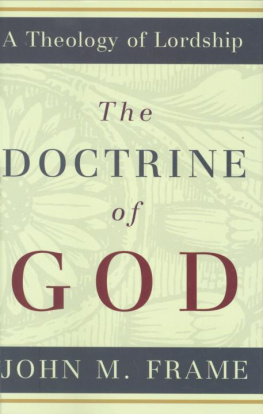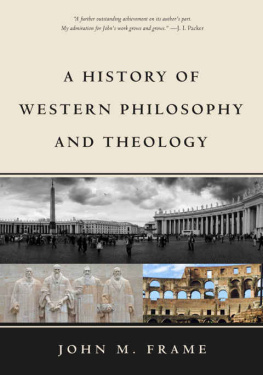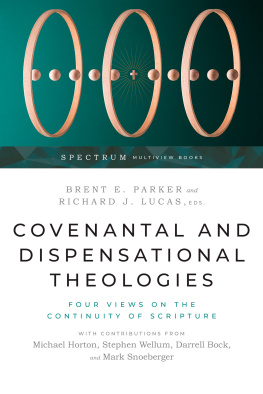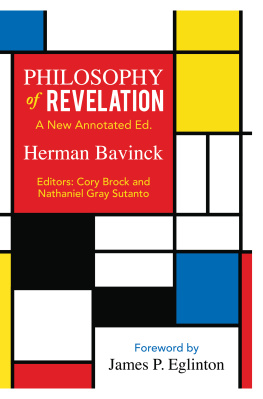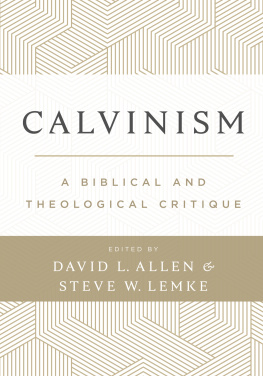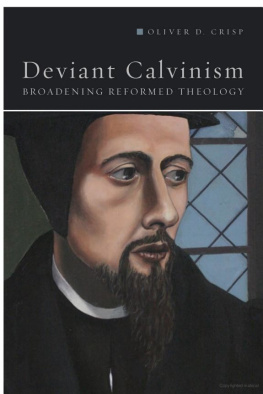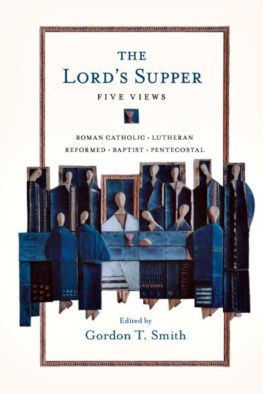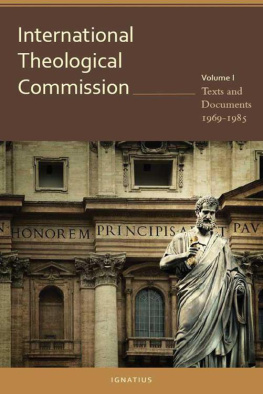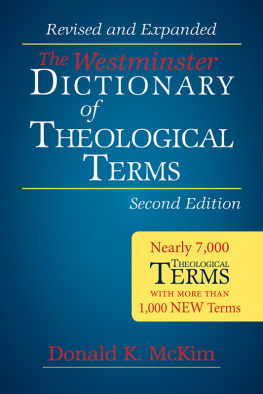JOHN M. FRAME



vii
xv
PART ONE: THE OBJECTS OF KNOWLEDGE
1. God, the Covenant Lord
A. The Biblical Concept of Lordship
(1) Lordship and Covenant
(2) Transcendence and Immanence
(3) Control, Authority, Presence
B. Lordship and Knowledge
(1) Knowability and Incomprehensibility
a. Everyone Knows God.
b. Limitations on Our Knowledge of God
(2) Knowing as a Covenant Relationship
a. A Knowledge About God as Lord
b. A Knowledge Subject to God as Lord
Excursus: Wisdom and Truth
C. The Unbeliever's Knowledge
(1) Similarities
(2) Differences
(3) The Logic of Unbelief
2. God and the World
A. The Covenant Law
B. The World, Our Situation
C. Ourselves
D. Relationships Between Objects of Knowledge
(1) The Law and the World
a. The Law Is Necessary to Understand the World.
b. The World Is Necessary to Understand the Law.
c. The Non-Christian Loses the Facts and the Law.
(2) The World and the Self
a. Self-Knowledge and Knowledge of the World Are Correlative.
b. Facts and Their Interpretations Are Inseparable.
(3) The Law and the Self
E. Perspectives
3. God and Our Studies
A. Theology
(1) Schleiermacher
(2) Hodge
(3) A "Covenantal" Definition
B. Philosophy and Science
C. Apologetics
Appendix A: Perspectivalism
Appendix B: Encyclopedia
Appendix C: Meaning
Appendix D: Fact and Interpretation
PART TWO: THE JUSTIFICATION OF KNOWLEDGE
4. The Problem of Justification
A. Does Knowledge Need Justification?
B. Perspectives on Justification
C. Ethics and Knowledge
D. Traditional Epistemologies
(1) Rationalism
a. Innate Knowledge
b. Sensation
c. Formalism
d. A Christian Analysis
e. A Second Christian Analysis
f. The Paradox of Analysis
(2) Empiricism
a. Verification
b. Verifiability
c. Deception
d. The Scientific Method
e. Empiricism Too Limited
f. Knowledge of God
g. Facts
h. A Christian Analysis
(3) Subjectivism
a. Inter-subjective Truth
b. Consistency
c. Facts and Criteria
d. A Christian Analysis
(4) Combinations
a. Plato
b. Kant
5. Perspectives on justification
A. Normative Justification
(1) God's Epistemological Authority
(2) Presuppositions
(3) The Oddness of Religious Language
(4) All Knowing Is Theologizing.
(5) Scripture Justifies Itself.
(6) Circularity
a. No Alternative to Circularity
b. Circularity Restricted
c. Narrow and Broad Circles
d. Circularity and Persuasion
e. Competing Circularities
(7) Coherence
(8) Certainty
a. Sin
b. Ignorance
c. Limited Knowledge
(9) Hierarchies
a. Nature and Scripture
b. Priority Structures Within Scripture
c. Priorities in Our Use of Scripture
B. Situational Justification
(1) Facts and Norms
(2) Correspondence
(3) Evidence as Justification for Faith
(4) Evidence and the Word
(5) Evidence and Faith
C. Existential Justification
(1) Knowledge and Life: Pragmatic Truth
(2) Persuasion and Proof
(3) "Cognitive Rest"--A Godly Sense of Satisfaction
(4) Knowledge, Regeneration, and Sanctification
(5) "Seeing as'-Existential and Normative Perspectives
(6) A Corporate Existential Perspective
(7) Autonomy Again?
D. Which Perspective Is Ultimate?
E. Justification in Apologetics
PART THREE: THE METHODS OF KNOWLEDGE
6. The Normative Perspective The Use of Scripture
A. Anti-Abstractionism
B. Perspectivalism
C. Contextual Exegesis
(1) Sentence-Level Exegesis
(2) Multiple Contexts
(3) Proof Texts
(4) Exemplarism
(5) The Richness of Scripture's Meaning
(6) Text and Telos
D. Uses of Scripture
(1) Varieties of Biblical Language
(2) Literary Forms
(3) Speech Acts
(4) Pictures, Windows, Mirrors
(5) Areas of Application
E. Traditional Theological Programs
(1) Exegetical Theology
(2) Biblical Theology
(3) Systematic Theology
(4) Practical Theology
7. The Situational Perspective-Language as a Tool of Theology
A. Vagueness in Language
B. Vagueness in Scripture
C. Technical Terms
D. Metaphors, Analogies, Models
E. Negation in Theology
F. Contrast, Variation, Distribution
G. Systematic Ambiguity in Nonorthodox Positions
H. Labels
1. Morals
J. Language and Reality
K. Language and Humanity
8. The Situational Perspective-Logic as a Tool of Theology
A. What Is Logic?
(1) The Science of Argument
(2) A Hermeneutical Tool
(3) A Science of Commitment
B. The Certainty of Logic
C. Biblical Warrant for Using Logic in Theology
D. Limitations of Logic
E. Logical Order
F. Mutual Implications Among Doctrines
G. Burden of Proof
H. Some Types of Arguments
(1) Deduction
(2) Induction
(3) Reductio ad Absurdum
(4) Dilemma
(5) A Fortiori
(6) Throwaway Arguments
(7) Others ...
1. Fallacies
(1) Irrelevant Conclusion
(2) Threat of Force
(3) Comparative ad Hominem
(4) Positive Circumstantial ad Hominem
(5) Negative Circumstantial ad Hominem
(6) Argument From Silence or Ignorance
(7) Appeal to Pity
(8) Appeal to Emotion
(9) Appeal to Authority
(10) False Cause
(11) Genetic Fallacy
(12) Ambiguities of Causality
(13) Confusion Between Multiple and Single Causation
(14) Complex Question
(15) Equivocation
(16) Amphiboly
(17) Accent
(18) Composition
(19) Division
(20) Denying the Antecedent

